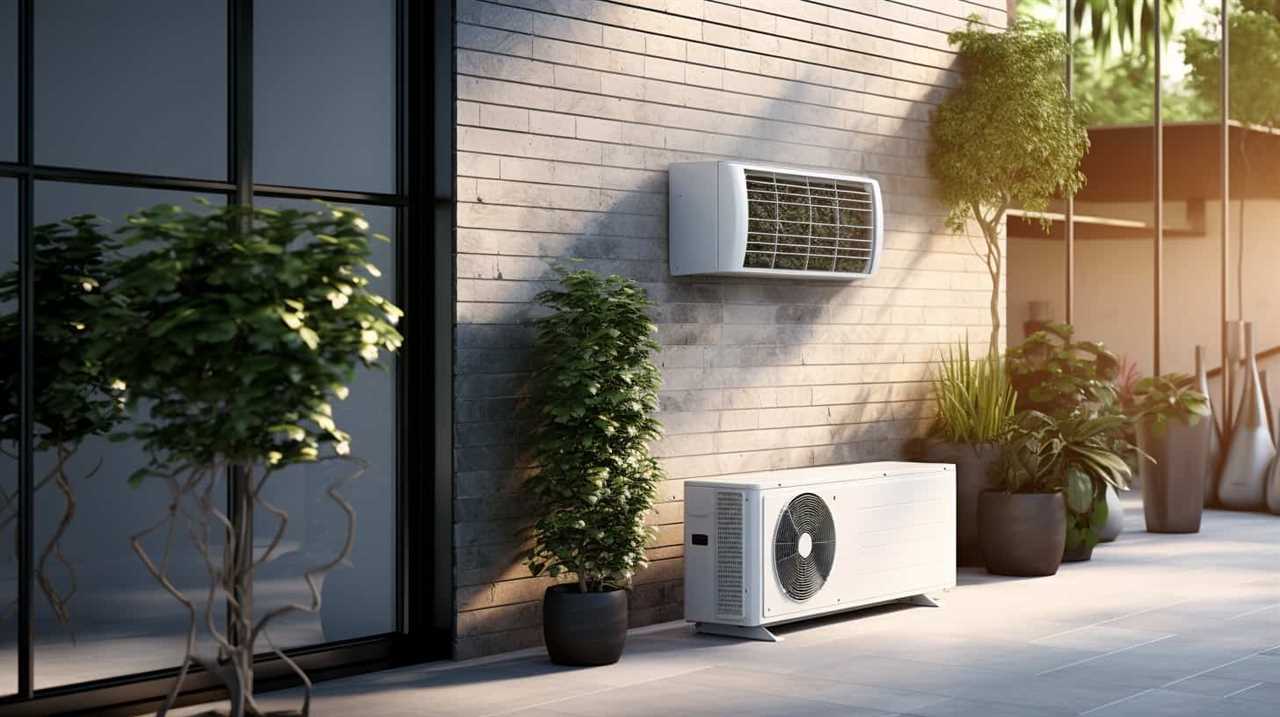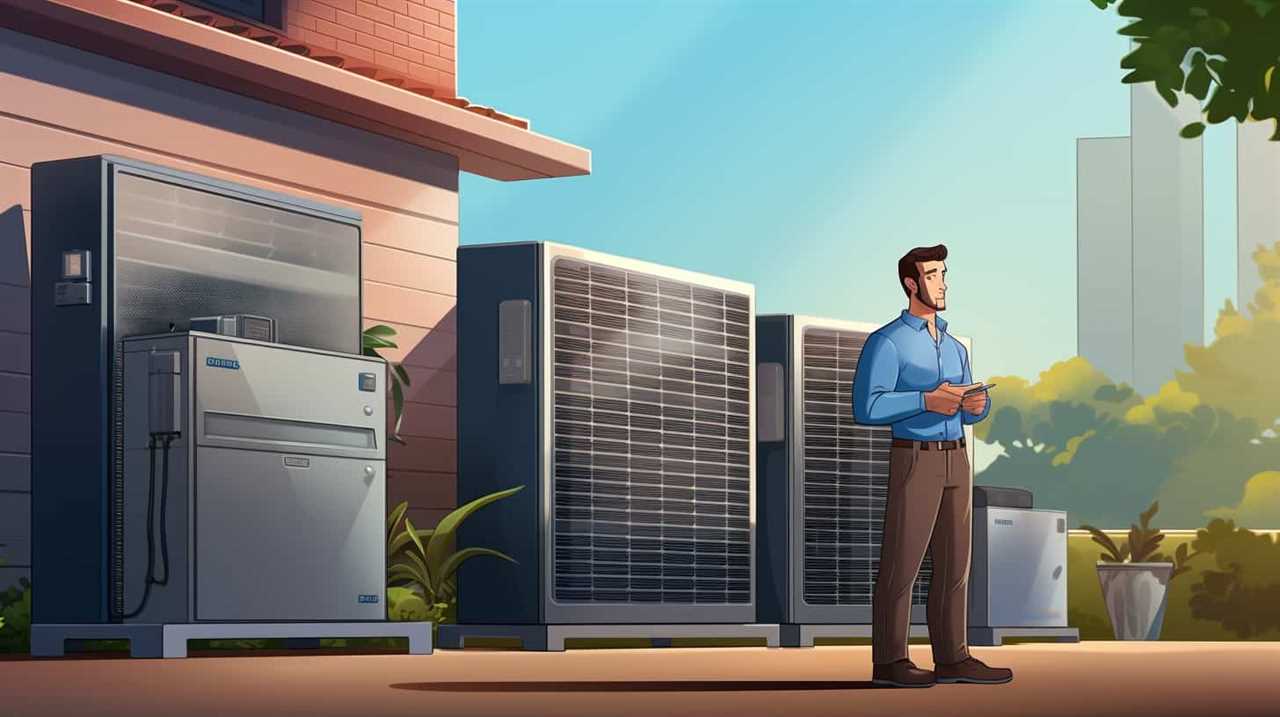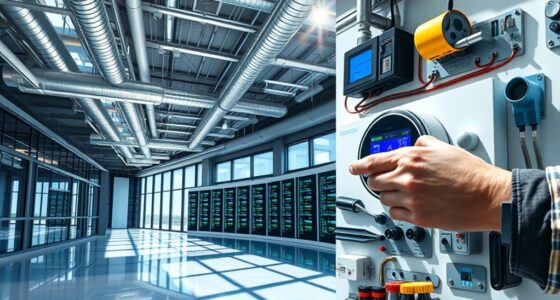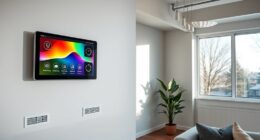Having trouble with your HVAC heat pump? Search no more! In this tutorial, we’re going to guide you through solving typical issues, including problems with airflow, unusual sounds, and smells.
We’ll also help you address performance issues, freezing or leaking heat pumps, and electrical problems. Whether you’re a seasoned DIYer or new to HVAC systems, we’ve got you covered.
Let’s dive in and get your heat pump back up and running efficiently.
Key Takeaways
- Refrigerant leaks can cause decreased cooling or heating performance
- Thermostat malfunctions can result in unresponsive adjustments or incorrect readings
- Weak airflow can be caused by clogged filters
- Clogged filters reduce efficiency and performance
Common Issues With Your HVAC Heat Pump
We’ll now address some common issues with your HVAC heat pump.

One common problem is troubleshooting refrigerant leaks. If you notice a decrease in cooling or heating performance, it could be due to a refrigerant leak. To identify the leak, check for hissing sounds or oil stains around the unit. Once the leak is located, it can be repaired by a certified technician who’ll seal the leak and recharge the system with the correct amount of refrigerant.
Another issue is fixing thermostat malfunctions. If your heat pump isn’t responding to temperature adjustments or is displaying incorrect readings, the thermostat may need to be calibrated or replaced. Consult the user manual for instructions or contact a professional for assistance.
Understanding the Thermostat and Settings
To properly troubleshoot your HVAC heat pump, we recommend understanding the thermostat and its settings. The thermostat is a crucial component that controls the operation of your heat pump and ensures optimal comfort in your home. Here are four key aspects of thermostat programming and troubleshooting:
Programming: Familiarize yourself with the different programming options available on your thermostat. This includes setting the desired temperature, scheduling temperature changes throughout the day, and utilizing energy-saving features.

Temperature Calibration: Ensure that your thermostat accurately measures and displays the temperature. If you notice a discrepancy between the displayed temperature and the actual room temperature, you may need to recalibrate or replace your thermostat.
Sensor Placement: The location of your thermostat’s temperature sensor is crucial for accurate temperature readings. Make sure it isn’t obstructed by furniture, direct sunlight, or drafts that could affect its performance.
Troubleshooting: If you encounter issues with your thermostat, such as unresponsive buttons or incorrect temperature readings, refer to the manufacturer’s manual for troubleshooting steps. Common solutions may include resetting the thermostat or replacing batteries.
Understanding these aspects of thermostat programming and troubleshooting will help you effectively manage and maintain your HVAC heat pump system.

Troubleshooting Airflow Problems
When troubleshooting airflow problems in your HVAC heat pump, it’s important to consider the causes of weak airflow.
One common cause is clogged filters, which can greatly affect the airflow. To address poor airflow, solutions may include cleaning or replacing the filters, checking the ductwork for any obstructions, and ensuring the blower motor is functioning properly.
Weak Airflow Causes
What could be causing weak airflow in our HVAC heat pump?
There are several potential reasons behind this issue. Here are four common causes of weak airflow and their corresponding solutions:

Clogged air filters: A dirty or blocked air filter restricts airflow. Regularly cleaning or replacing the air filters can help improve airflow.
Blocked vents or registers: Obstructions in the vents or registers can impede air circulation. Check for any objects or debris blocking the airflow and clear them away.
Ductwork leaks: Leaky ducts can cause air to escape before reaching the desired areas. Sealing the leaks with duct tape or hiring a professional to repair the ductwork can enhance airflow.
Malfunctioning blower motor: A faulty blower motor can result in weak airflow. Contact a qualified technician to inspect and repair or replace the motor if necessary.

Clogged Filters Affecting Airflow
Two common causes of weak airflow in our HVAC heat pump are clogged air filters and blocked vents.
Clogged filters can significantly affect the airflow of your heat pump system, reducing its efficiency and performance. It’s important to regularly clean or replace your air filters to prevent them from becoming clogged. Clogged filters restrict the flow of air, causing your heat pump to work harder and consume more energy. By keeping your filters clean, you can ensure proper airflow and maintain optimal performance.
Regular maintenance is crucial in preventing clogged filters and maintaining a well-functioning heat pump system. By scheduling routine inspections and cleaning or replacing filters as needed, you can prevent airflow problems and prolong the lifespan of your HVAC heat pump.
Solutions for Poor Airflow?
We can address poor airflow in our HVAC heat pump by checking for obstructions in the ductwork. Improving ventilation and resolving ductwork issues are crucial steps in troubleshooting airflow problems. Here are four solutions to consider:

Inspect the ducts: Look for any visible signs of damage, such as holes, leaks, or disconnected sections. Repair or replace damaged ductwork to ensure proper airflow.
Clean the vents and registers: Dust, debris, and dirt can accumulate in the vents and registers, restricting airflow. Regularly clean them to remove any obstructions and improve ventilation.
Check the air filter: A clogged or dirty air filter can hinder airflow. Replace the air filter according to the manufacturer’s recommendations, typically every 1-3 months, to maintain optimal airflow.
Consider duct sealing: Leaky ducts can significantly affect airflow. Hire a professional to inspect and seal any leaks to enhance overall system performance.

Investigating Strange Noises and Odors
When it comes to troubleshooting your HVAC heat pump, strange noises and odors can be indicators of potential issues. Unusual sounds such as grinding, banging, or rattling may suggest problems with the motor or fan.
Identifying strange odors, such as a burning smell or musty odor, can help pinpoint issues with electrical components or mold growth.
Unusual Heat Pump Sounds
If our heat pump is making unusual sounds or emitting strange odors, it’s important to investigate the issue promptly. These symptoms could indicate a potential problem with the heat pump system that requires attention.
To help you understand and address the issue, here are four common types of unusual sounds that your heat pump might make:

Grinding or squealing noise: This could indicate a problem with the motor bearings or the fan belt. It’s crucial to address this issue promptly to avoid further damage.
Rattling or vibrating noise: This may be caused by loose components or debris in the system. Regular heat pump maintenance can help prevent these issues.
Hissing or gurgling noise: This could indicate a refrigerant leak or a problem with the refrigerant flow. It’s recommended to contact a professional for heat pump repair in such cases.
Banging or clanging noise: This might be due to a loose or broken part inside the heat pump. Immediate attention is required to prevent further damage.

Identifying Strange Odors
Strange odors can be a sign of a potential issue with the heat pump system, so it’s important to investigate them promptly. Identifying strange odors can help homeowners prevent potential hazards and detect electrical issues in their HVAC heat pump.
When a strange odor is detected, the first step is to determine the source. It could be a burnt smell, indicating an electrical problem, or a musty smell, suggesting mold or mildew growth. Other odors, such as a rotten egg smell, could indicate a gas leak.
Regardless of the odor, it’s crucial to turn off the heat pump and contact a professional technician for further inspection and repair. Ignoring strange odors can lead to safety risks and further damage to the heat pump system.
Troubleshooting Noise and Smells
We will investigate any strange noises or smells coming from the HVAC heat pump to troubleshoot and address any potential issues.

Here are four steps to troubleshoot noise and smells in your HVAC heat pump:
Identify the source of the noise: Pay attention to the type and location of the noise. Is it a rattling or banging sound? Is it coming from the indoor or outdoor unit? This information will help determine the cause and necessary action.
Check for loose or damaged components: Vibrations can cause screws and bolts to loosen over time. Inspect the unit for any loose or damaged parts and tighten or replace them as needed.
Inspect the fan and motor: A faulty fan or motor can cause excessive noise. Check for any obstructions or signs of wear and tear. If necessary, lubricate moving parts or replace the fan or motor.

Identify burning smells: If you detect a burning smell, immediately turn off the heat pump and contact a professional. This could indicate an electrical issue or overheating, which requires immediate attention.
Addressing Heat Pump Performance Issues
Our first step in addressing heat pump performance issues is to check the air filters for any clogs or dirt buildup. Clogged air filters can restrict airflow, reducing the efficiency of the heat pump.
Next, we should troubleshoot any wiring issues that may be affecting the heat pump’s performance. Faulty wiring can lead to improper operation or even system failure. It’s important to inspect the wiring connections, looking for loose or damaged wires.
Lastly, we need to address any potential refrigerant problems. Low refrigerant levels can cause the heat pump to struggle in providing adequate heating or cooling. A professional technician should be called to check for leaks and recharge the refrigerant if necessary.

Dealing With Freezing or Leaking Heat Pumps
If your heat pump is freezing or leaking, it’s important to address the issue promptly to prevent further damage. Freezing and leaking are common problems that can occur with heat pumps, and they can greatly affect the efficiency and effectiveness of your HVAC system.
Here are four steps you can take to deal with freezing or leaking heat pumps:
Check the air filters: Clogged or dirty air filters can restrict airflow and cause the heat pump to freeze. Clean or replace the filters regularly to ensure proper airflow.
Clear the outdoor unit: Remove any debris, leaves, or ice buildup around the outdoor unit. This will help improve airflow and prevent the heat pump from freezing.

Inspect the refrigerant levels: Low refrigerant levels can cause the heat pump to freeze. If you suspect a refrigerant leak, contact a professional to inspect and repair the issue.
Schedule regular maintenance: Regular heat pump maintenance can help prevent freezing and leaking issues. A professional technician can inspect and clean the system, ensuring optimal performance.
Troubleshooting Heat Pump Electrical Problems
To troubleshoot heat pump electrical problems, check the wiring connections and ensure that all switches and breakers are in the proper position. Faulty or loose connections can disrupt the electrical flow and cause issues with the heat pump’s operation. It is important to inspect the wiring for any signs of damage or wear, such as frayed or exposed wires. Additionally, testing heat pump components can help identify any faulty parts that may be causing electrical problems. This can be done by using a multimeter to measure voltage, resistance, and continuity. Refer to the table below for a quick reference guide on troubleshooting electrical connections and testing heat pump components.
| Issue | Possible Cause | Solution |
|---|---|---|
| Heat pump not turning on | Tripped breaker or blown fuse | Reset breaker or replace fuse |
| Inconsistent heating or cooling | Faulty thermostat | Replace thermostat |
| Heat pump running constantly | Defective control board | Replace control board |
| No airflow from vents | Blown motor capacitor | Replace motor capacitor |
Frequently Asked Questions
What Is the Average Lifespan of an HVAC Heat Pump?
The average lifespan of an HVAC heat pump is typically around 15 years. However, signs of wear and tear, such as decreased efficiency or frequent breakdowns, may indicate the need for replacement before then.

Can I Install a Heat Pump Myself, or Do I Need to Hire a Professional?
Can we install a heat pump ourselves or should we hire a professional? Save time, money, and potential headaches by hiring a professional for heat pump installation. They possess the expertise and ensure proper installation.
Is It Normal for My Heat Pump to Produce a Slight Odor During Operation?
Yes, it is normal for heat pumps to produce a slight odor during operation. Common causes of odor in HVAC heat pumps include dirty filters, mold growth, or electrical issues. To eliminate odors, clean or replace filters, inspect for mold, and address any electrical problems.
How Often Should I Schedule Maintenance for My Heat Pump?
We should schedule maintenance for our heat pump regularly to ensure optimal performance and prevent costly repairs. Regular maintenance can help identify and address issues early, improve energy efficiency, and extend the lifespan of the heat pump.
Can I Use My Heat Pump to Both Heat and Cool My Home?
Yes, you can use your heat pump to both heat and cool your home. It’s a cost-effective and efficient option. By using one system for both functions, you can enjoy the benefits of heat pump efficiency.

What Are Some Common Issues with Residential Heat Pump HVAC Systems?
What are some common issues with residential heat pump HVAC systems? Knowing the common problems can help homeowners troubleshoot their units. Take this residential heat pump hvac quiz to test your knowledge: What are the typical causes for a heat pump not heating or cooling effectively? How can you troubleshoot a system that is producing unusual noises or odors? These are just a few questions to gauge your understanding of residential heat pump HVAC systems.
Conclusion
In conclusion, troubleshooting your HVAC heat pump requires careful attention to detail and a systematic approach.
By understanding common issues, checking the thermostat and settings, investigating airflow problems, addressing strange noises and odors, and dealing with performance issues, freezing, leaking, or electrical problems, you can effectively diagnose and resolve any issues with your heat pump.
Remember, a well-maintained heat pump is key to ensuring optimal performance and comfort in your home.
As the saying goes, ‘An ounce of prevention is worth a pound of cure.’










